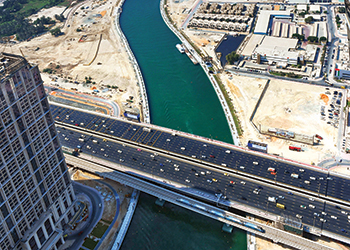Canal creation
01 December 2016
Besix’s work on the Dubai Water Canal included dredging 3.2 million cu m of soil and diverting existing utilities.
Besix has successfully completed Phase Three of the Dubai Water Canal in Business Bay through its Dubai-based entity, Belhasa Six Construct.
The project included the construction of the Dubai Creek extension as a fully navigable channel from Al Ras to Jumeirah, through the Business Bay development. It required the diversion of existing utilities and key services, which occurred in parallel with the removal of earth bunds within the Business Bay section of the canal, and dredging up of the canal bed to reach the level of -4 to -6 m, thereby allowing construction of the remaining sections of the quay wall.
Besix/Six Construct managing director Pierre Sironval says: “Some 3.2 million cu m of soil were dredged for the canal and 15,000 concrete blocks of 40 tonnes each were used to fortify the banks over a total length of 15 km.”
The main challenge, he says, was the diversion of the underground services so the excavation and construction of the 3-km-long canal could proceed smoothly.
“In addition, the installation of three sculptural pedestrian bridges in a record period was a fantastic achievement and we are proud to have contributed to this historic project in the UAE.”
.jpg) |
|
The Water Canal ... Besix’s scope also included three sculptural pedestrian bridges. |
Sironval continues: “During the construction process, we had to be extremely vigilant and careful whilst working on the Dubai Canal, as it cuts through a high-profile residential area, as well as some of the city’s main traffic arteries such as Al Wasl Road, Jumeirah Beach Road and Sheikh Zayed Road.
“To minimise the impact on the day-to-day traffic and the well-being of the local residents, our resourceful engineers tailored their planning and methods of execution to make sure they caused minimal disruption, and ensured that everything was orchestrated along with the RTA (Roads and Traffic Authority) to run as smoothly as possible.”
The canal’s width ranges from 80 to 120 m. Various bridges were built at a height that will allow luxury yachts and other boasts to pass underneath, and the canal culminates at an artificial crescent-shaped island along Jumeirah Park.
“With more than half a century experience in the Middle East, working with gravity blockwork walls, quay wall construction is one of the company’s main competencies, therefore we do not expect any issues once the site is open,” adds Sironval.
Treatment of the existing hyper-saline water impounded within the lagoons of Business Bay was also carried out by diluting the existing water and discharging it back into the sea through a 3-km-long pipeline, and re-flooding the canal after the completion of the works.
In addition, the project includes the installation of four water taxi stations, starting from the Creek right up to Business Bay and Jumeirah. The existing natural park at the Creek was untouched, thereby avoiding the area where the flamingos are settled.
The project, executed under supervision of the RTA in partnership with Halcrow-Parsons, was launched in January 2015.



